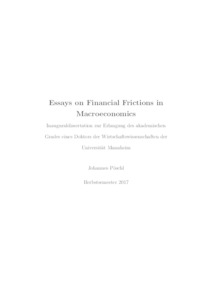|
Essays on financial frictions in macroeconomics
Pöschl, Johannes
![[img]](https://madoc.bib.uni-mannheim.de/43860/1.hassmallThumbnailVersion/Dissertation_Poeschl.pdf)  Vorschau |
|
PDF
Dissertation_Poeschl.pdf
- Veröffentlichte Version
Download (1MB)
|
|
URL:
|
https://madoc.bib.uni-mannheim.de/43860
|
|
URN:
|
urn:nbn:de:bsz:180-madoc-438600
|
|
Dokumenttyp:
|
Dissertation
|
|
Erscheinungsjahr:
|
2017
|
|
Ort der Veröffentlichung:
|
Mannheim
|
|
Hochschule:
|
Universität Mannheim
|
|
Gutachter:
|
Adam, Klaus
|
|
Datum der mündl. Prüfung:
|
21 November 2017
|
|
Sprache der Veröffentlichung:
|
Englisch
|
|
Einrichtung:
|
Fakultät für Rechtswissenschaft und Volkswirtschaftslehre > Geldpolitik und Makroökonomik (Adam 2008-)
Außerfakultäre Einrichtungen > GESS - CDSE (VWL)
|
|
Fachgebiet:
|
330 Wirtschaft
|
|
Normierte Schlagwörter (SWD):
|
Makroökonomie
|
|
Freie Schlagwörter (Englisch):
|
Financial Frictions , Macroeconomics , Capital Structure , Bank Runs
|
|
Abstract:
|
This dissertation consists of two chapters. In the first chapter, I study the dynamics of corporate debt maturity over the business cycle, and how the debt maturity structure of a firm matters for its investment decisions. I find that in the data, the corporate debt maturity structure is pro-cyclical, especially for small firms. Moreover, larger firms use more long-term debt in general. I construct a quantitative model to explain these findings. The main results are twofold: First, maturity dynamics can be explained by a trade-off between default incentives, which favor short-term debt, and roll-over costs, which favor long-term debt. Second, long-term debt can lead to substantial under-investment.
In the second chapter, I study bank capital regulation in a model with endogenous bank runs. The model economy has both retail and shadow banks. Financial instability arises, because retail banks will occasionally run on shadow banks. The regulator faces a trade-off between reducing financial instability and ensuring that financial intermediation is efficient. I find that a dynamic capital requirement on retail banks is an effective policy instrument to reduce the frequency of bank runs, because it allows retail banks to build up a buffer during normal times that they can use to increase leverage capacity during a bank run. The cost of imposing a capital requirement is however high, if banks cannot issue external equity.
|
 | Dieser Eintrag ist Teil der Universitätsbibliographie. |
 | Das Dokument wird vom Publikationsserver der Universitätsbibliothek Mannheim bereitgestellt. |
 Suche Autoren in Suche Autoren in
Sie haben einen Fehler gefunden? Teilen Sie uns Ihren Korrekturwunsch bitte hier mit: E-Mail
Actions (login required)
 |
Eintrag anzeigen |
|
|
